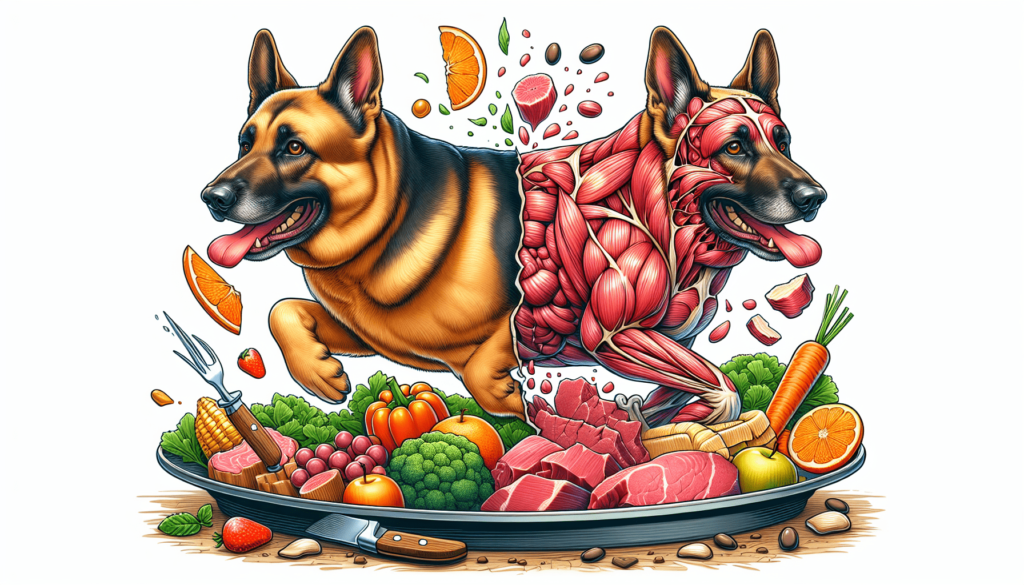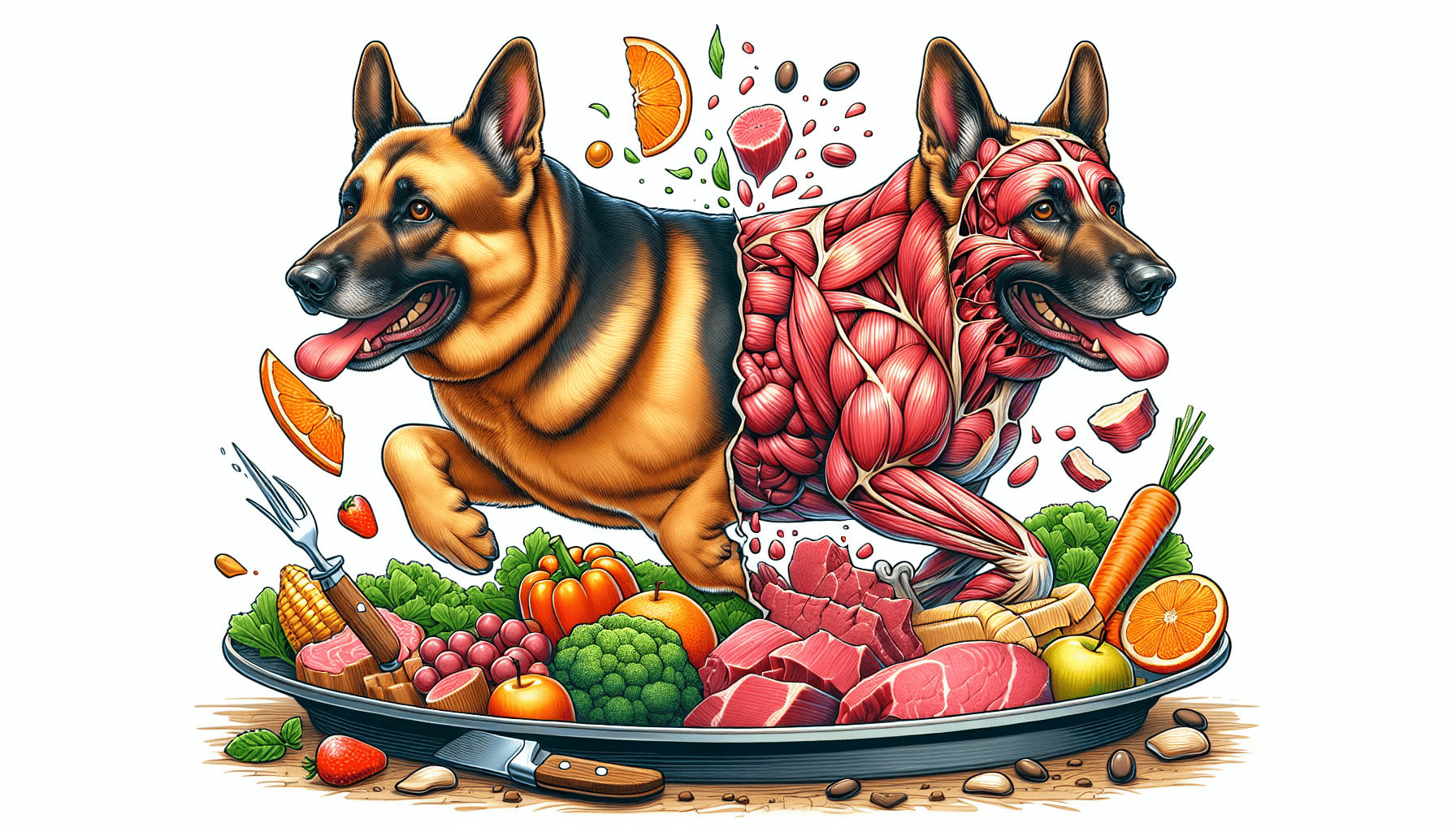You may not realize it, but what you feed your beloved furry friend can have a significant impact on their behavior. The old saying “you are what you eat” holds true for dogs as well, and their diet plays a crucial role in shaping their behavior and overall well-being. In this article, we will explore how diet affects dog behavior and discuss the importance of choosing the right food for your four-legged companion. Whether you have an energetic puppy or a laid-back senior dog, understanding the impact of diet on dog behavior is key to ensuring a happy and healthy life for your furry companion.

Nutritional Requirements for Dogs
Understanding a Dog’s Nutritional Needs
As a responsible pet owner, it is crucial to understand the nutritional requirements of your dog. Proper nutrition plays a vital role in their overall health and well-being, including their behavior. Dogs, like humans, require a balanced diet to thrive. They need a combination of macronutrients (protein, carbohydrates, and fats) and micronutrients (vitamins and minerals) to support their bodily functions and maintain proper behavior.
Macronutrients and Micronutrients
Macronutrients are the nutrients that dogs need in larger quantities. Protein is one of the most crucial macronutrients for dogs. It is the building block of tissues, muscles, and organs, and it plays a significant role in their overall behavior. Carbohydrates provide dogs with energy, and fats are essential for hormone production and the absorption of fat-soluble vitamins.
Micronutrients, on the other hand, are required in smaller quantities but are equally important. Vitamins and minerals support various bodily functions, including cognitive function, which influences behavior. For example, vitamin B complex helps regulate mood and reduce stress, while minerals like magnesium and zinc contribute to proper brain function.
The Role of Protein in Behavior
Protein is a critical nutrient that significantly impacts a dog’s behavior. It plays an essential role in the production of neurotransmitters, such as serotonin and dopamine, which regulate mood, sleep, and behavior. Adequate protein intake can help promote stable behavior and prevent behavioral issues such as aggression and anxiety.
Common Behavioral Issues in Dogs
Aggression and Irritability
Aggression and irritability are common behavioral problems in dogs. These issues can stem from various factors, including genetics, upbringing, and yes, diet. A diet lacking in essential nutrients, particularly protein, can contribute to aggressive behavior. By ensuring your dog receives an appropriate amount of high-quality protein, you can help maintain their behavioral balance and reduce aggression and irritability.
Hyperactivity and Restlessness
Hyperactivity and restlessness can also be linked to diet. When dogs consume diets high in simple carbohydrates and sugars, it can lead to energy spikes followed by crashes, resulting in erratic behavior. A balanced diet with complex carbohydrates, along with appropriate exercise, can help regulate your dog’s energy levels and promote a calmer demeanor.
Anxiety and Fearfulness
Anxiety and fearfulness are behavioral issues that can greatly impact a dog’s quality of life. These issues can be influenced by factors such as genetics, environment, and diet. Certain nutrients, such as omega-3 fatty acids found in fish oil, are known to have calming effects on dogs. Incorporating these nutrients into their diet can help reduce anxiety and fearfulness, leading to better behavior and overall emotional well-being.
Influence of Diet on Behavior
Research Studies on Diet and Behavior
Numerous research studies have explored the impact of diet on dog behavior. These studies consistently highlight the correlation between nutrition and behavior. For example, a study published in the Journal of Veterinary Behavior found that dogs fed a diet rich in omega-3 fatty acids exhibited reduced aggression and increased trainability compared to dogs fed a standard diet. These findings emphasize the importance of a well-balanced diet in promoting positive behavior.
Effects of Nutrient Deficiencies
Nutrient deficiencies can have detrimental effects on a dog’s behavior. Just as a lack of vitamins and minerals can affect human behavior, the same applies to dogs. A deficiency in essential nutrients can lead to mood instability, anxiety, and even depression in dogs. It is essential to provide a complete and balanced diet to prevent these deficiencies and maintain optimal behavior.
Impact of Processed Foods
The impact of processed foods on dog behavior has been a topic of concern in recent years. Highly processed commercial dog foods often lack the necessary nutrients and contain additives that can impact behavior negatively. Studies have shown a significant correlation between the consumption of certain artificial additives and hyperactive behavior in dogs. Opting for high-quality, minimally processed dog foods can help mitigate these issues and promote better behavior.
The Gut-Brain Connection
Understanding the Gut Microbiome
The gut microbiome refers to the collection of microorganisms residing in a dog’s gastrointestinal tract. This complex ecosystem plays a vital role in maintaining overall health, including behavior. The gut microbiome helps regulate the production of neurotransmitters, such as serotonin and GABA, which have a substantial influence on a dog’s mood and behavior. A healthy gut microbiome is essential for optimal behavior.
Communication between the Gut and Brain
The gut and brain are interconnected through the gut-brain axis, a bidirectional communication system. This axis allows signals to be transmitted between the gut and the brain, influencing behavior. For example, stress or inflammation in the gut can trigger changes in behavior, such as anxiety or aggression. Maintaining a healthy gut through proper nutrition can positively impact behavior by promoting a balanced gut-brain connection.
Effects of Diet on Gut Health
Diet plays a crucial role in maintaining a healthy gut. Feeding your dog a diet rich in prebiotics and probiotics can support beneficial gut bacteria, leading to improved gut health. This, in turn, can positively impact behavior. Certain foods, such as fermented vegetables or supplements specifically designed for gut health, can help maintain a balanced gut microbiome and promote optimal behavior.

Choosing the Right Dog Food
Reading and Understanding Labels
Choosing the right dog food is essential for meeting your dog’s nutritional needs and promoting good behavior. When selecting dog food, take the time to read and understand the labels. Look for high-quality protein sources, such as chicken or salmon, listed as the primary ingredients. Avoid foods that contain excessive fillers, artificial additives, or by-products. Opt for options that are labeled as complete and balanced, indicating that they meet your dog’s nutritional requirements.
Considerations for Specific Dietary Needs
Some dogs may require special diets due to allergies, sensitivities, or underlying health conditions. If your dog has specific dietary needs, consult with your veterinarian to determine the best course of action. They may recommend hypoallergenic or prescription diets tailored to your dog’s requirements. Identifying and addressing these specific needs through diet can help improve behavior and overall well-being.
Consulting with a Veterinarian
When in doubt about your dog’s nutritional needs, consulting with a veterinarian is always a wise choice. A veterinarian can assess your dog’s individual needs and make appropriate dietary recommendations. They can also provide guidance on portion control and feeding schedule, ensuring your dog receives the right nutrients in the right quantities to support their behavior and overall health.
Raw or Homemade Diets
Benefits and Risks of Raw Diets
Raw diets, consisting of raw meat, bones, and vegetables, have gained popularity in recent years. Proponents of raw diets claim benefits such as improved coat condition, increased energy, and better behavior. However, it is essential to note that raw diets come with risks. Raw meat can contain harmful bacteria, and an imbalanced homemade diet can lead to nutrient deficiencies. If considering a raw or homemade diet, it is crucial to consult with a veterinarian or a veterinary nutritionist to ensure your dog’s nutritional needs are met while minimizing potential risks.
Balancing Homemade Diets
If you choose to feed your dog a homemade diet, it is crucial to provide a balanced and complete diet. Dogs require a specific ratio of nutrients to thrive, and it can be challenging to achieve this balance with homemade meals alone. Including a variety of high-quality protein sources, carbohydrates, and vegetables can be a good starting point. However, working with a veterinary nutritionist can help ensure all nutrient requirements are met and minimize the risk of deficiencies or imbalances.
Supplements for Homemade Diets
Supplements may be necessary when feeding homemade diets to ensure your dog receives all the necessary nutrients. A veterinary nutritionist can help determine which supplements, such as multivitamins or omega-3 fatty acids, are appropriate for your dog’s specific needs. Adding supplements to your dog’s homemade diet can help optimize their behavior and overall health.
Effectiveness of Behavioral Modifications
Addressing Behavior through Diet Changes
Behavioral modifications can be an effective approach to addressing certain behavior problems in dogs. In some cases, dietary changes alone can make a significant difference. As previously discussed, ensuring your dog receives a balanced diet with appropriate nutrient levels can promote better behavior. However, it is crucial to note that not all behavior problems can be resolved solely through diet changes. Consulting with a professional dog trainer or behaviorist is often necessary to develop a comprehensive behavior modification plan.
Combining Food and Training for Behavior Solutions
Combining food and training can be a powerful tool in addressing behavior problems. Using positive reinforcement techniques, you can reward desired behaviors with high-value treats or food. This encourages your dog to repeat the desired behavior and helps reinforce positive behavior patterns. When combined with a well-balanced diet, this approach can lead to significant improvements in your dog’s behavior.
Importance of Consistency
Consistency is key when modifying behavior through diet and training. Dogs thrive on routine and predictability, so it is essential to establish consistent feeding schedules and training sessions. Consistency helps reinforce desired behaviors and minimizes confusion. By maintaining a consistent approach, you can effectively address behavior problems and promote positive behavioral changes in your dog.
Preventing Behavior Problems through Diet
Puppy Nutrition and Behavior
Proper nutrition plays a crucial role in preventing behavior problems in puppies. During their early development stages, puppies’ brains are rapidly growing, and providing the right nutrients is vital. Feeding a high-quality puppy food appropriate for their breed size and ensuring they receive adequate protein, healthy fats, and essential vitamins and minerals can promote proper brain development and reduce the risk of behavior issues later in life.
Transitioning to Adult Dog Food
As your puppy grows, they will eventually need to transition to adult dog food. This transition should be gradual to minimize gastrointestinal upset. When selecting an adult dog food, consider your dog’s breed, size, activity level, and any specific dietary needs they may have. Providing a balanced adult dog food will help maintain their behavior and overall health.
Senior Dog Nutrition and Cognitive Function
As dogs age, their nutritional needs change. Senior dogs may experience cognitive decline, which can manifest as behavior changes such as confusion, restlessness, or anxiety. Specialized senior dog foods are available that provide targeted nutrition to support cognitive function. These foods often contain antioxidants, omega-3 fatty acids, and other nutrients that support brain health and can contribute to improved behavior in senior dogs.
Food Allergies and Intolerances
Identifying Food Allergies
Food allergies can cause a range of symptoms in dogs, including behavioral issues. Common signs of food allergies include itching, excessive licking or chewing, gastrointestinal upset, and changes in behavior. Identifying food allergies requires a thorough elimination diet or food trial, overseen by a veterinarian. By identifying and eliminating the triggering allergens from your dog’s diet, you can help alleviate behavioral problems caused by allergies.
Behavioral Symptoms of Food Allergies
Food allergies can manifest as behavioral symptoms in dogs. Dogs with food allergies may exhibit restlessness, irritability, increased anxiety, or even aggression. If you suspect your dog may have a food allergy, it is essential to consult with your veterinarian to determine the cause and develop an appropriate diet plan to manage the allergy and improve behavior.
Elimination Diets for Diagnosis
Elimination diets are commonly used to diagnose food allergies in dogs. The process involves removing common allergenic ingredients from your dog’s diet and gradually reintroducing them to identify the allergen. This process requires strict adherence to the elimination diet guidelines and close monitoring of your dog’s behavior and symptoms. By discovering and eliminating the specific allergen, you can help improve behavior and enhance your dog’s overall well-being.
Additional Factors Affecting Dog Behavior
Exercise and Activity Levels
Exercise and physical activity play a significant role in a dog’s behavior. Regular exercise helps burn excess energy, reduces anxiety, and promotes a calmer disposition. Dogs that do not receive sufficient exercise may exhibit restlessness, hyperactivity, or even destructiveness. Ensuring your dog gets enough physical activity, tailored to their breed and size, is crucial in maintaining good behavior.
Stress and Environmental Enrichment
Stress and environmental enrichment can impact a dog’s behavior. Stressful environments or lack of mental stimulation can lead to behavioral issues such as anxiety or excessive barking. Providing your dog with a safe, enriched environment that includes appropriate toys, puzzles, and activities can help alleviate stress and promote better behavior. Creating a calm and engaging environment for your dog plays a vital role in their overall well-being.
Socialization and Training
Proper socialization and training are essential for a well-behaved dog. Early socialization exposes puppies to various people, animals, and environments, helping them develop into calm and confident dogs. Positive reinforcement training techniques encourage desired behaviors and help shape your dog’s behavior. By focusing on socialization and training, you can help prevent behavior problems and foster a strong bond with your dog.
In conclusion, a dog’s diet has a significant impact on their behavior. By understanding and meeting their nutritional requirements, you can support their overall well-being and prevent behavior problems. Choosing the right dog food, whether commercial or homemade, and considering any specific dietary needs is crucial. Additionally, addressing behavior through diet modifications, combining food and training, and maintaining consistency can help address existing behavior problems effectively. By prioritizing proper nutrition and considering other factors affecting behavior, such as exercise, environment, and socialization, you can ensure your dog leads a happy and well-behaved life.

